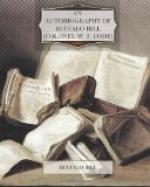Eight buffaloes were killed by Alexis during the three days we remained in camp. He spent most of his time in the saddle, and soon became really accomplished. After he had satisfied himself as to his own ability as a buffalo killer he expressed a desire to see how the Indians hunted them. He had never seen bows and arrows used in the pursuit of game. Spotted Tail, who had joined the hunt according to his promise, picked out some of his best hunters, and when Alexis joined them directed them to surround a herd. They were armed with bows and arrows and lances.
I told the Grand Duke to follow one particularly skillful brave whose name was Two Lance, who had a reputation for being able to drive an arrow clear through the body of a bull. The Indian proved equal to his fame. He hauled alongside of an animal, and, bending his powerful bow, let fly an arrow, which passed directly through the bulky carcass of a galloping brute, who fell dead instantly. The arrow, at the Grand Duke’s request, was given to him as a souvenir which he doubtless often exhibited as proof of his story when some of his European friends proved a little bit skeptical of his yarns of the Western Plains.
When the visitor had had enough of buffalo hunting, orders were given to return to the railroad. The conveyance provided for Alexis and General Sheridan was an old-fashioned Irish dogcart, drawn by four spirited cavalry horses. The driver was old Bill Reed, an overland-stage driver, and our wagon-master. The Grand Duke vastly admired the manner in which he handled the reins.
On the way over, General Sheridan told his guest that I too was a stage-driver, and Alexis expressed a desire to see me drive.
“Cody,” called the general, “come back here and exchange places with Reed. The Grand Duke wants you to drive for a while.”
In a few minutes I had the reins, and we were racing across the prairie. We jogged along steadily enough, despite a pretty rapid pace, and this did not suit General Sheridan at all.
“Shake ’em up a little, Bill,” he told me as we were approaching Medicine Creek. “Show us some old-time stage-driving.”
I gave the horses a sounding crack with the whip, and they jumped into their work with a real interest. The load was light and their pace increased with every second.
Soon they were fairly flying over the ground, and I had all I could do to maintain any control over them. At last we reached a steep hill, or divide, the further side of which sloped down to the creek. There was no brake on the wagon, and the four horses were not in the least inclined to hold back, appearing to be wholly unconcerned as to what might happen.
It was impossible to restrain them. My work was cut out for me in keeping them on the track. So I let them set their own pace down the hill. The wagon bounded and rebounded from the bumps in the road, and my two distinguished passengers had to keep very busy holding their seats.




